| Listing 1 - 10 of 24 | << page >> |
Sort by
|
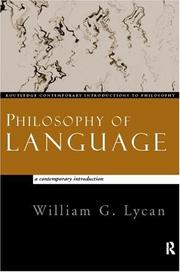
ISBN: 0415171164 0415171156 020313849X 1134696051 128035447X 0203190734 9780203190739 9780203138496 9780415171151 9780415171168 6610354472 9786610354474 9781134696055 9781134696000 1134696000 9781134696048 1134696043 Year: 2000 Volume: *1 Publisher: London Routledge
Abstract | Keywords | Export | Availability | Bookmark
 Loading...
Loading...Choose an application
- Reference Manager
- EndNote
- RefWorks (Direct export to RefWorks)
Philosophy of Language introduces the student to the main issues and theories in twentieth-century philosophy of language. Topics are structured in three parts in the book. Part I, Reference and Referring Expressions, includes topics such as Russell's Theory of Descriptions, Donnellan's distinction, problems of anaphora, the description theory of proper names, Searle's cluster theory, and the causal-historical theory. Part II, Theories of Meaning, surveys the competing theories of linguistic meaning and compares their various advantages and liabilities. Part III, Pragmatics and Speec
Philosophy of language --- Language and languages --- Langage et langues --- Philosophy. --- Philosophie --- Philosophy --- 800.1 --- Taalfilosofie --- 800.1 Taalfilosofie --- Mental philosophy --- Humanities --- Language and languages - Philosophy --- Acqui 2006
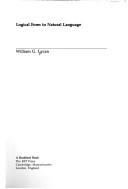
ISBN: 0262121085 Year: 1984 Publisher: Cambridge, Mass. MIT Press
Abstract | Keywords | Export | Availability | Bookmark
 Loading...
Loading...Choose an application
- Reference Manager
- EndNote
- RefWorks (Direct export to RefWorks)
Logic --- Philosophy of language --- Langage et logique --- Language and logic --- Pragmatics --- Pragmatiek --- Pragmatique --- Semantics --- Semantiek --- Sémantique --- Sémasiologie --- Taal en logica --- Language and languages --- Langage et langues --- Philosophy --- Philosophie --- -Language and logic --- Formal semantics --- Semasiology --- Semiology (Semantics) --- Comparative linguistics --- Information theory --- Lexicology --- Meaning (Psychology) --- Pragmalinguistics --- General semantics --- Logic, Symbolic and mathematical --- Semantics (Philosophy) --- Linguistics and logic --- Logic in language --- Foreign languages --- Languages --- Anthropology --- Communication --- Ethnology --- Philology --- Linguistics --- Language and logic. --- Pragmatics. --- Semantics. --- Philosophy. --- Sémantique --- Languages - Philosophy.
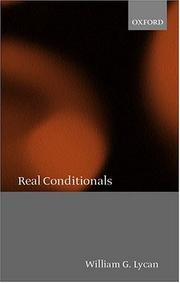
ISBN: 0199242070 0199285519 9786612365805 9786610904617 1280904615 1282365800 0191529273 0191515906 9780191529276 9780191515903 1383037639 Year: 2001 Publisher: Oxford Clarendon
Abstract | Keywords | Export | Availability | Bookmark
 Loading...
Loading...Choose an application
- Reference Manager
- EndNote
- RefWorks (Direct export to RefWorks)
Logicians have written a great deal on the semantics of conditional sentences. This book contends that insufficient attention has been paid to the syntax of conditionals, as investigated by linguists.
English language --- Grammar --- Grammar, Comparative and general --- Semantics --- Conditionnel --- Sémantique --- Conditionals --- Semantics. --- Conditionals. --- Sémantique --- Formal semantics --- Semasiology --- Semiology (Semantics) --- Comparative linguistics --- Information theory --- Language and languages --- Lexicology --- Meaning (Psychology) --- Conditionals (Grammar) --- Hypothetical clauses (Grammar) --- Protasis (Grammar) --- Conditional clauses --- Conditional constructions --- Conditional sentences --- Hypothetical clauses --- Protasis --- Mood --- Sentences --- Linguistics --- Philology --- Conditionals (Logic)
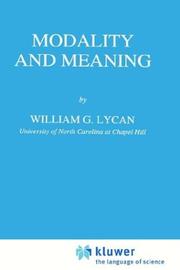
ISBN: 0792330064 0792330072 9401109362 9780792330066 Year: 1994 Volume: 53 Publisher: Dordrecht Kluwer Academic
Abstract | Keywords | Export | Availability | Bookmark
 Loading...
Loading...Choose an application
- Reference Manager
- EndNote
- RefWorks (Direct export to RefWorks)
Lexicology. Semantics --- Philosophy of language --- Metafysica --- Metaphysics --- Modaliteit (Logica) --- Modality (Logic) --- Modalité (Logique) --- Métaphysique --- Semantics --- Semantics (Philosophy) --- Semantiek --- Semantiek (Filosofie) --- Sémantique --- Sémantique (Philosophie) --- Sémasiologie --- Language and languages --- Langage et langues --- Philosophy --- Philosophie --- -Modality (Logic) --- Intension (Philosophy) --- Logical semantics --- Semantics (Logic) --- Semeiotics --- Significs --- Syntactics --- Unified science --- Logic, Symbolic and mathematical --- Logical positivism --- Meaning (Psychology) --- Philosophy, Modern --- Semiotics --- Signs and symbols --- Symbolism --- Analysis (Philosophy) --- Definition (Philosophy) --- Formal semantics --- Semasiology --- Semiology (Semantics) --- Comparative linguistics --- Information theory --- Lexicology --- God --- Ontology --- Philosophy of mind --- Modal logic --- Logic --- Nonclassical mathematical logic --- Bisimulation --- Foreign languages --- Languages --- Anthropology --- Communication --- Ethnology --- Philology --- Linguistics --- Métaphysique --- Modalité (Logique) --- Sémantique --- Sémantique (Philosophie) --- Language and languages - Philosophy --- Modalité (linguistique) --- Modalité (logique)
Book
ISBN: 0521340470 0521335809 9780521335805 Year: 1988 Publisher: Cambridge Cambridge University press
Abstract | Keywords | Export | Availability | Bookmark
 Loading...
Loading...Choose an application
- Reference Manager
- EndNote
- RefWorks (Direct export to RefWorks)
An account of the nature of belief, and justified and unjustified belief. The account is teleological: beliefs are justified as the products of cognitive functions established by natural selection. The issue of "realism", of the relation between explanation and the real world is also discussed.
Belief and doubt --- Justification (Theory of knowledge) --- Croyance et doute --- Justification (Théorie de la connaissance) --- 234.121 --- Rechtvaardiging. Dispositie voor de rechtvaardiging. Geloof alleen volstaat niet --- Belief and doubt. --- Justification (Theory of knowledge). --- 234.121 Rechtvaardiging. Dispositie voor de rechtvaardiging. Geloof alleen volstaat niet --- Justification (Théorie de la connaissance) --- Knowledge, Theory of --- Conviction --- Doubt --- Consciousness --- Credulity --- Emotions --- Philosophy --- Psychology --- Religion --- Will --- Agnosticism --- Rationalism --- Skepticism
Book
ISBN: 0262620537 9780262620536 Year: 1986 Publisher: Cambridge, MA : M.I.T. Press,
Abstract | Keywords | Export | Availability | Bookmark
 Loading...
Loading...Choose an application
- Reference Manager
- EndNote
- RefWorks (Direct export to RefWorks)
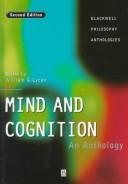
ISBN: 0631205454 0631212043 9780631205456 Year: 1999 Volume: 8 Publisher: Oxford Blackwell
Abstract | Keywords | Export | Availability | Bookmark
 Loading...
Loading...Choose an application
- Reference Manager
- EndNote
- RefWorks (Direct export to RefWorks)
Mind and body. --- Thought and thinking. --- Cognitive science. --- Body [Human ]--Psychological aspects --- Body and mind --- Cognitieve wetenschap --- Esprit et corps --- Geest en lichaam --- Mind-cure --- Pensée --- Sciences cognitives --- Thought and thinking --- Wetenschap [Cognitieve ] --- Cognitive science --- Mind and body --- Mind --- Thinking --- Thoughts --- Educational psychology --- Philosophy --- Psychology --- Intellect --- Logic --- Perception --- Psycholinguistics --- Self --- Body and soul (Philosophy) --- Human body --- Mind-body connection --- Mind-body relations --- Somatopsychics --- Brain --- Dualism --- Philosophical anthropology --- Holistic medicine --- Mental healing --- Parousia (Philosophy) --- Phrenology --- Psychophysiology --- Science --- Philosophy of mind --- Psychological aspects --- Cognitive psychology --- Theory of knowledge
Book
ISBN: 0631167633 0631160760 9780631167631 Year: 1990 Publisher: Oxford Blackwell
Abstract | Keywords | Export | Availability | Bookmark
 Loading...
Loading...Choose an application
- Reference Manager
- EndNote
- RefWorks (Direct export to RefWorks)
Cognitive psychology --- Theory of knowledge --- Cognitive science --- Mind and body --- Thought and thinking --- Mind --- Thinking --- Thoughts --- Educational psychology --- Philosophy --- Psychology --- Intellect --- Logic --- Perception --- Psycholinguistics --- Self --- Body and mind --- Body and soul (Philosophy) --- Human body --- Mind-body connection --- Mind-body relations --- Mind-cure --- Somatopsychics --- Brain --- Dualism --- Philosophical anthropology --- Holistic medicine --- Mental healing --- Parousia (Philosophy) --- Phrenology --- Psychophysiology --- Science --- Philosophy of mind --- Psychological aspects --- Mind and body. --- Thought and thinking. --- Cognitive science. --- Cognition --- Esprit et corps --- Pensée
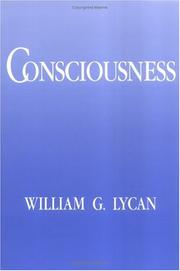
ISBN: 0262278677 0585002827 0262620960 0262121247 9780585002828 9780262121248 9780262278676 Year: 1987 Publisher: Cambridge (Mass.): MIT press
Abstract | Keywords | Export | Availability | Bookmark
 Loading...
Loading...Choose an application
- Reference Manager
- EndNote
- RefWorks (Direct export to RefWorks)
In this book, William Lycan defends an original theory of mind that he calls "homuncular functionalism." What is consciousness? The answer to this question has been pondered upon, grappled with, and argued about since time immemorial. There has never been an answer that achieved consensus; certainly philosophers have never agreed.In this book, William Lycan defends an original theory of mind that he calls "homuncular functionalism." He argues that human beings are "functionally organized information-processing systems" who have no non-physical parts or properties. However, Lycan also recognizes the subjective phenomenal qualities of mental states and events, and an important sense in which mind is "over and above" mere chemical matter. Along the way, Lycan reviews some diverse philosophical accounts of consciousness-including those of Kripke, Block, Campbell, Sellars, and Castaneda, among others-and demonstrates how what is valuable in each opposing view can be accommodated within his own theory.Consciousness is Lycan's most ambitious book, one that has engaged his attention for years. He handles a fascinating subject in a unique and undoubtedly controversial manner that will make this book a mainstay in the field of philosophy of mind.Consciousness, with these earlier works, is a Bradford Book.
Consciousness --- Philosophy & Religion --- Philosophy --- Apperception --- Mind and body --- Perception --- Psychology --- Spirit --- Self --- Philosophical anthropology --- Consciousness. --- Conscience --- COGNITIVE SCIENCES/General --- PHILOSOPHY/Philosophy of Mind/General
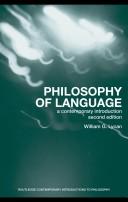
ISBN: 9780415957526 0415957524 9780415957519 0415957516 9780203930007 0203930002 9780415957519 9780415957526 9780203930007 1135907641 1281260436 9786611260439 Year: 2008 Publisher: London Routledge
Abstract | Keywords | Export | Availability | Bookmark
 Loading...
Loading...Choose an application
- Reference Manager
- EndNote
- RefWorks (Direct export to RefWorks)
Philosophy of Language: A Contemporary Introduction introduces the student to the main issues and theories in twentieth century philosophy of language, focusing specifically on linguistic phenomena. Topics are structured in four parts in the book. Part I, Reference and Referring Expressions, includes topics such as Russell's Theory of Desciptions, Donnellan's distinction, problems of anaphora, the description theory of proper names, Searle's cluster theory, and the causal-historical theory. Part II, Theories of Meaning, surveys the competing theories of linguistic meaning and compares their various advantages and liabilities. Part III, Pragmatics and Speech Acts, introduces the basic concepts of linguistic pragmatics, includes a detailed discussion of the problem of indirect force and surveys approaches to metaphor. Part IV, new to this edition, examines the four theories of metaphor.
Taalfilosofie --- Language and languages --- Philosophy --- Language --- Langage et langues --- Philosophy. --- Philosophie --- Taal en filosofie. --- Taalfilosofie. --- Language and languages - Philosophy --- Philosophy - Language
| Listing 1 - 10 of 24 | << page >> |
Sort by
|

 Search
Search Feedback
Feedback About UniCat
About UniCat  Help
Help News
News